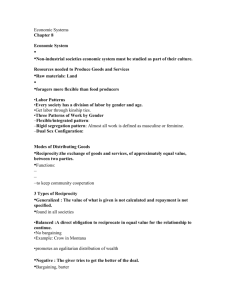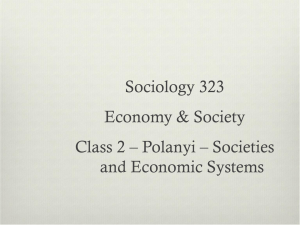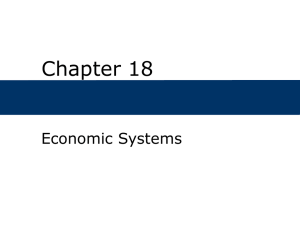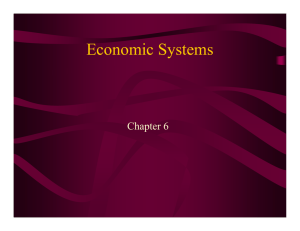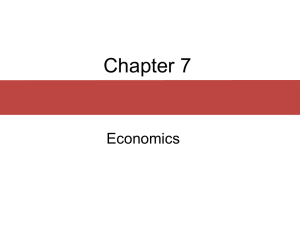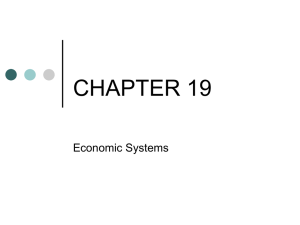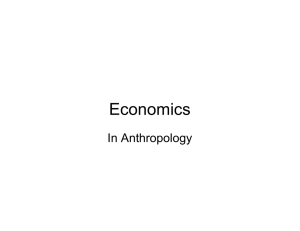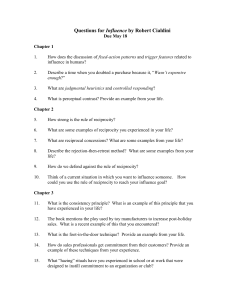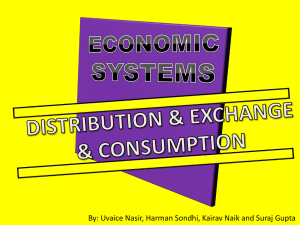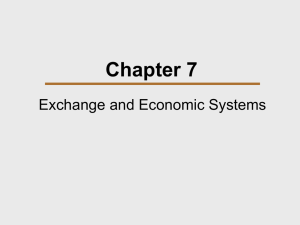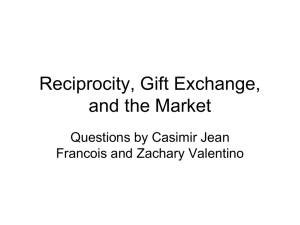Unit 2B: Economics
advertisement
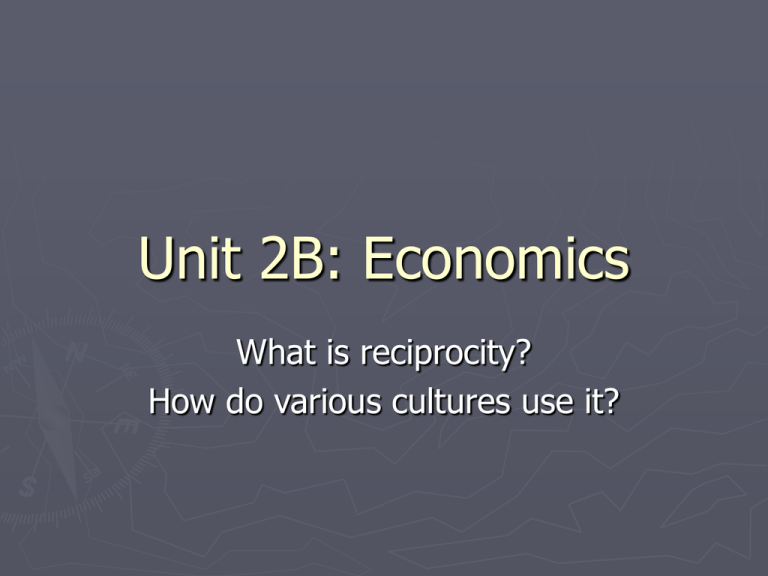
Unit 2B: Economics What is reciprocity? How do various cultures use it? Economics concepts ► Every culture has a limited amount of vital resources ► Must develop systems of production, distribution, and consumption Economic Anthropology ► Economics = focus on production, distribution, and consumption as observed in industrialized world ► Economic Anthropology = studies of the three areas comparatively in all societies in the world, industrialized and non-indus. Western Economic View ► Western economists assume that individuals and corporations are motivated by desire to maximize material well-being ► Other societies’ economic principles may be based on reciprocity or re-distribution practices emphasizing cooperation and generosity ► Even in USA there can be increases in instances where people fail to maximize economic well-being Allocation of Natural Resources ► Every society has a set of rules governing allocation and use of resources ► The degree to which humans are territorial varies widely throughout the world ► Idea of personal property is absent in most food collecting, pastoral, and horticultural societies Resources: Food Collectors ► Land is not owned ► Follow migratory patterns of ► Claiming/defending territory animals takes time, energy, and technology that foragers choose not to expend ► Territoriality can lead to conflict ► Amount of communal control of land varies ► Will have flexible boundaries if animals are mobile and supplies unpredictable ► Likely to live in permanent settlements and maintain greater land control if supplies are plentiful and predictable Resources: Pastoralists ► Require extensive territory and access to water and pasturage for livestock ► Must work out arrangements among themselves and with nonpastoralists to gain access to pasturage ► Corporate (non-individual) control of pastures is general rule ► Allocation of land and resources depends on ecological variables, types of animals, size of population relative to land, relationship of pastoralists to larger society Resources: Horticulturalists ► Tend to live on communally controlled land, usually by extended kinship group ► Small family units retain rights as long as they work the land and are in good standing with larger family ► No advantage to owning land that can’t be used permanently Resources: Intensive Agriculturalists ► Resources are allocated using principle of private individual ownership ► Western concept of individual property rights has affected research with nonWestern peoples ► Most westerners believe communal property will be destroyed or degraded because people lack an individual incentive to maintain it Production ► Definition: process of obtaining goods from the natural environment and transforming them into usable objects ► Vast range of systems of production ► Why any society produces certain items is determined by economic factors and cultural values ► Most societies fail to exploit all the resources at their disposal Units of Production ► All societies have some sort of productive unit comprising people with specific tasks to perform ► In most nonindustrialized societies, basic unit of production is the household ► Most, if not all, goods and services consumed are produced by members of the household (nuclear or extended) Division of Labor ► Every society distinguishes to some degree between appropriate work for men and women (gender) and adults and children (age) Division of Labor: Gender Specialization ► Men and women often assigned roles because of social, political, and historical forces operating in individual societies ► Theories explaining common, if not universal, division of labor by gender Men’s greater body mass and strength makes them better equipped for hunting, warfare, land clearing Women’s tasks compatible with childcare Mend tend to be more expendable so they engage in dangerous activities Division of Labor: Age Specialization ► Elderly, because of waning strength, often prohibited from certain tasks or expected to engage in different activities from earlier years ► Because of lack of knowledge and physical strength, children are often excluded from certain tasks In growing numbers, children under 14 are working full time in the global economy Negative effects of child labor include working long hours under deplorable conditions for low wages Distribution of Goods and Services ► Systems of exchange are essential for every economy ► Allow people to dispose of surpluses ► Maximize diversity of goods and services consumed ► Goods and services are allocated in all societies according to 3 modes of distribution Reciprocity Redistribution Market exchange ► Although more than one mode can operate in a society, usually only one predominates Reciprocity ► Definition: exchange of goods and services of roughly equal value between two parties without the use of money 3 basic types ►Generalized reciprocity ►Balanced reciprocity ►Negative reciprocity Generalized Reciprocity ► An exchange system common among food collectors and contributes to their very survival ► Generosity is the highest ideal ► Hoarding and stinginess are seen as antisocial ► Usually between family members or close friends ► Involves highest level of moral obligation ► No expectation of immediate return ► In USA, seen in giving between parents & kids Balanced Reciprocity ► An exchange system involving expectation that goods and services of equivalent value will be returned within a specific period of time ► Involves more formal relationships, greater social distance, and strong obligation to repay original gift ► Major economic motivation is to exchange surplus good and services for those in short supply ► Creates a system of affiliation (Kula Ring) Negative Reciprocity ► Form of exchange between equals in which the parties attempt to take advantage of each other ► Based on principle of trying to get something for nothing ► Involving the most impersonal (possibly hostile) social relations ► Sense of altruism and social obligation is at its lowest ► Incompatible with close, harmonious relations ► Most often practiced against strangers and enemies Redistribution ► Goods are given to a central authority and then given back to people in a new pattern ► Involves 2 stages: inward flow of goods and services to social center, followed by outward dispersal of goods and services back to society ► Most common in societies that have political hierarchies Redistribution: Tribute ► Serves social function by dispensing goods within a society and affirming political power of the chief and value of solidarity among the people ► Equitable distribution is rarely found in most situations where tribute is given Redistribution: Big Men/Feast Givers ► Self made leaders who are able to convince their relatives/neighbors to contribute surplus goods for the sake of community wide feasting ► Economic entrepreneurs ► Found widely throughout Melanesia and New Guinea Work hard to produce surpluses and encourage followers to do the same, all for the sake of giving it away Growing evidence that there are also big women in Melanesia Redistribution: Bridewealth ► Involves transfer of valuable commodities from groom’s lineage to the bride’s lineage as a precondition for marriage ► Mechanism for maintaining roughly equitable distribution of goods within a society Redistribution: Potlatch ► Chiefs or prominent men announce rights, privileges, and high social status within their communities ► Claims accompanied by elaborate feasting and gift giving ► Host would either give away or destroy all of his personal possessions ► Serves as a mechanism for dispersal of material goods ► Also serves man socio-political functions Redistribution: Prestige Economies ► Institutions of the Kula, potlatch, and Big men/Women are not only mechanisms of distribution, but also ways of allocating prestige and social status through affiliation Redistribution: Market Exchange ► Goods and services are bought and sold, often through the use of a standardized currency ► Less personal than exchanges based on reciprocity or other forms of redistribution ► Exchanges predominantly economic in nature ► People more interested in maximizing profits than in maintaining a long-term relationship ► Likely found in sedentary societies that produce appreciable surpluses and have complex division of labor
